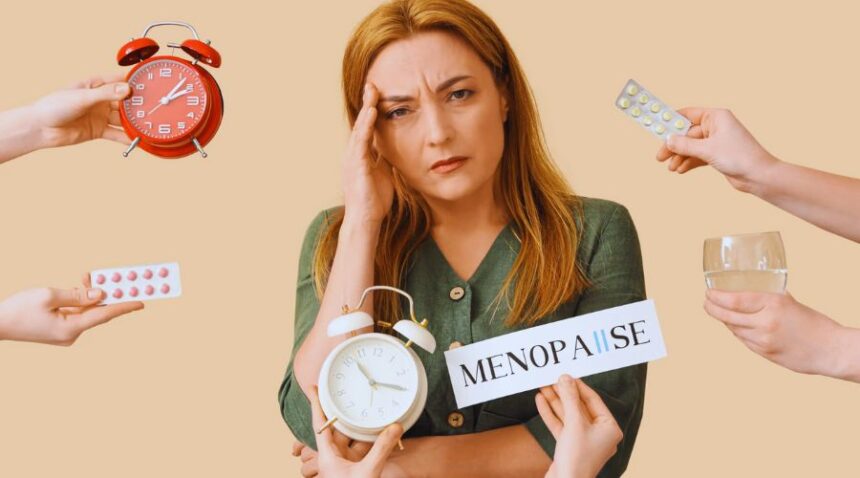Are you curious to know about what are the top 5 symptoms of Menopause and why they matter? If yes, this article will tell you all about this system in detail.
Throughout your life, your body goes through continuous change. The menopause, which begins between the ages of 45 and 55, is the stage of a woman’s life when she stops having periods. Menopause symptoms can make this transition somewhat difficult, even though some people may find relief from a monthly period.
To learn about the menopause phase symptoms in detail, stick to this article thoroughly to the end.
Top 5 Symptoms Of Menopause And Why It Matters
Here, we have mentioned 5 different symptoms of Menopause that might majorly hinder your health, emotions, and overall well-being. To learn about these symptoms in detail, it is suggested to be glued to this article until the conclusion.
1. Hot Flashes and Night Sweats
Why It Matters: Night sweats and hot flashes are two of the most prevalent and annoying menopausal symptoms. A hot flash is an unexpected feeling of heat that is often followed by flushing, sweating, and a fast heartbeat. A related condition called night sweats causes excessive sweating while you sleep, which can be uncomfortable and disturb your sleep.
These symptoms are important because they may harm a person’s way of life by resulting in social detachment, anxiety, and embarrassment. Night sweats can cause poor sleep, which can lead to daytime fatigue, irritation, and trouble focusing. Comfort and well-being can be greatly enhanced by knowing how to control these symptoms with dietary changes, cooling methods, and medical treatments.
2. Mood Swings and Emotional Changes
Why It Matters: Mood swings, irritability, anxiety, and even depression can result from hormonal changes that occur during menopause. Increased sensitive emotions, signs of depression, or mysterious outbursts of anger are common complaints among women.
Since these emotional shifts can impact relationships, productivity at work, and general mental health, it’s critical to identify them. During this transition, many women experience feelings of loneliness or miscommunication. To manage mood swings and maintain emotional well-being, one can turn to loved ones, therapy, or, in extreme situations, medication.
3. Sleep Disturbances and Insomnia
Why It Matters: Many women going through menopause have trouble falling asleep, staying asleep, or getting a good night’s sleep. Sleep disturbances are caused by many factors, including hormonal changes, anxiety, and night sweats.
Lack of sleep has an indirect impact on general health. Long-term insomnia may damage cognitive function, raise stress levels, cause weight gain, and weaken immunity. Sleep quality can be enhanced by implementing relaxation techniques, cutting down on caffeine, and creating a regular bedtime routine. Under a doctor’s supervision, medical treatments like hormone replacement therapy (HRT) or sleep aids may be considered in extreme cases.

4. Vaginal Dryness and Discomfort
Why It Matters: Vaginal tissues get drier, thinner, and less elastic as estrogen levels drop. This can raise the risk of urinary tract infections and cause itching, discomfort, and pain during sexual activity.
Vaginal dryness impacts daily comfort and general vaginal health in addition to sexual health. Although many women are ashamed to talk about this symptom, it is crucial to look for answers. Prescription medications such as vaginal estrogen therapy, over-the-counter lubricants, and vaginal moisturizers can all help reduce discomfort and preserve vaginal health.
5. Weight Gain and Metabolic Changes
Why It Matters: During menopause, many women gain weight, particularly around the abdomen. This weight gain is caused by hormonal changes, metabolic changes, and a loss of muscle mass, which makes it more difficult to maintain a healthy body weight.
Gaining weight during menopause is associated with a higher risk of diabetes, heart disease, and other metabolic conditions. It may also affect mental health and self-esteem. During menopause, weight management and general health can be supported by strength training, a balanced diet, and regular exercise.
Managing Menopause Symptoms
Women can manage their health and well-being more actively if they are aware of these symptoms. Menopausal symptoms can be reduced by techniques such as maintaining a healthy lifestyle, exercising, controlling stress, and looking into other therapies or medical options like hormone replacement therapy.
Conclusion
Menopause is a significant life transition for women, but it doesn’t have to be a time of pain and suffering. By recognizing and treating symptoms such as mood swings, vaginal dryness, sleep issues, hot flashes, and weight gain, women can take charge of their health. Menopause can be easier to manage and more enjoyable with the correct techniques and support.
Also, check out about Benefits Of Multivitamin Capsules For Your Health.
FAQ
1. What are the top 5 symptoms of menopause?
A. The most common symptoms are hot flashes, night sweats, mood swings, vaginal dryness, and sleep disturbances.
2. How long do menopause symptoms last?
A. Symptoms can last for several years, typically between 4–10 years.
3. Can menopause symptoms be treated?
A. Yes, treatments include hormone therapy, lifestyle changes, and natural remedies.





